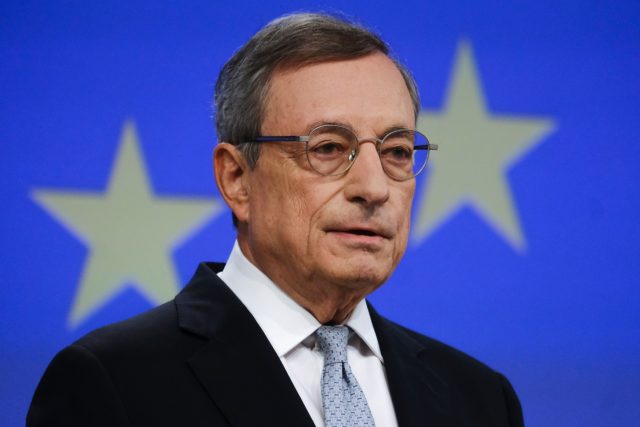
Twelve months after the publication of his report on European competitiveness, Mario Draghi reiterates the need for a radical shift in the economic and political governance of the European Union. The former President of the European Central Bank chose Brussels as the stage to launch a new appeal to European leaders, forcefully emphasizing that time is limited. The international context marked by trade wars, geopolitical tensions and a rapid progress in strategic sectors such as artificial intelligence makes a collective leap in quality even more urgent.
THE CENTRALITY OF COMPETITIVENESS AS A FACTOR FOR SURVIVAL
In the contemporary debate on European integration, competitiveness has become an essential variable not only for economic prosperity, but also for the continent’s political and social stability. Draghi emphasized that the current European growth model is showing signs of exhaustion, aggravated by the lack of a comprehensive investment plan. Dependence on external forces, both in terms of energy supplies and military defence, exposes the Union to growing vulnerabilities. In this context, the call for competitiveness takes on the character of an existential warning: without renewal, Europe risks losing not only ground to the United States and China, but also its ability to independently determine its own destiny.
PUBLIC DEBT AS A CRUCIAL ISSUE
One of the most problematic aspects that emerged in Draghi’s speech concerns the issue of public debt. According to estimates, the European debt-to-GDP ratio is set to rise over the next ten years, approaching thresholds considered critical. The prospect of less robust economic growth than expected further exacerbates this scenario. Draghi believes that the problem cannot be addressed with isolated national instruments, since the scale of the necessary investments exceeds the capacity of individual Member States. Hence the idea of a common debt, not as a universal panacea but as a tool to finance large-scale shared projects capable of increasing overall productivity.
TENSIONS WITH THE UNITED STATES AND THE CHINESE CHALLENGE
The geopolitical landscape of recent months has highlighted Europe’s weakness as a negotiator. The trade tariffs imposed by Washington, among the highest in decades, have highlighted the Union’s limited ability to influence the direction of transatlantic relations. At the same time, China continues to strengthen its competitive position not only industrially, but also technologically and financially. Europe thus appears to be squeezed between two poles that possess clear strategies and significant resources, yet struggle to define a unified path. Draghi interprets this situation as a warning sign: without common tools and a shared vision, the risk is that of having to passively adapt to the rules of others.
THE QUESTION OF EUROPEAN SOVEREIGNTY
The concept of sovereignty has been placed at the heart of Draghi’s reasoning, but not in its traditional sense, tied to national borders. His analysis suggests that today sovereignty is primarily at stake in the ability to influence global economic and technological decisions. Losing competitiveness means losing decision-making autonomy, becoming dependent on external powers. In this sense, the slowness of European decision-making processes and political fragmentation are identified as the true enemies of sovereignty. Excuses related to institutional timelines or internal consensus can no longer justify inertia, since the speed of ongoing transformations does not allow for delays.
THE URGENCY OF A BINDING CALENDAR
One of the most relevant methodological elements of Draghi’s speech is the insistence on the need to establish concrete deadlines and measurable results. The history of European integration, from the single market to the common currency, demonstrates that successes have been possible only thanks to clear objectives and consistent political commitment. Today, this formula appears to be the only viable way to prevent Europe from becoming trapped in a sterile debate. The call to move from generic promises to defined goals, therefore, represents an attempt to introduce a principle of political accountability that has so far been too weak at the continental level.
THE RELATIONSHIP WITH EUROPEAN CITIZENS
Another central aspect of the argument concerns the perception that citizens and businesses have of institutions. According to Draghi, there is a widespread willingness to make the sacrifices necessary to boost competitiveness, but this willingness risks being lost if governments continue to appear indecisive or incapable of grasping the gravity of the situation. The frustration generated by political inertia can transform into distrust of the European project itself. Hence the invitation to “look beyond daily worries” to rediscover a sense of common destiny. A year after his report, Mario Draghi offers a stern but lucid assessment of the state of the European Union. The warning is clear: without rapid and coordinated action, the continent risks losing not only economic competitiveness, but its political sovereignty itself. Global challenges no longer allow for wait-and-see strategies. Only greater financial integration, accompanied by concrete deadlines and renewed political responsibility, can guarantee Europe a leading role on the international stage. The issue concerns not only governments, but the entire social and economic fabric, which demands from European leaders a response worthy of the extraordinary times we are living in.



 Subscribe
Subscribe